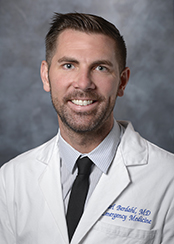
Carl Berdahl, MD, MS
Emergency Medicine
MD – Yale University School of Medicine, New Haven, CT
Residency – Emergency Medicine, USC Keck School of Medicine, Los Angeles, CA
Biography: Dr. Carl Berdahl, emergency medicine physician, is interested in exploring how federal healthcare policies affect the quality of healthcare, and how organizations can reduce administrative burdens for frontline personnel.
Dr. Berdahl worked with mentors including Drs. Teryl Nuckols, Jack Needleman, and Gery Ryan, on a project entitled, “Primary Care Physicians and the Merit-Based Incentive Payment System (MIPS): A Longitudinal Qualitative Study Of Physician Attitudes, Beliefs, And Self-Reported Practice Changes.” He also partnered with the LA County Medical Association. The purpose of the study was to examine primary care physician (PCP) beliefs about quality of care, a new pay-for-performance policy, and physician-reported impact of MIPS on clinical practice. Using qualitative methods, Dr. Berdahl and his mentor team aimed to 1) explore PCP attitudes and beliefs regarding measurement of the quality and value of care; 2) examine PCP attitudes and beliefs regarding the MIPS policy and its implications for patients and physicians; and 3) describe PCPs’ self-reported responses to the MIPS policy in their practices. Dr. Berdahl used results from the study to inform the development of a national survey-based investigation of MIPS’s impact on primary care practice. Results were presented at the National Clinician Scholars Program Annual Meeting in New Haven, CT in November 2017.
Dr. Berdahl additionally worked with Dr. David Schriger on a project entitled, “Charting versus reality: How accurately does physician charting reflect the clinical encounter?” and with Drs. Teryl Nuckols, Bob Brook, and David Schriger on a policy paper entitled, “The Merit-Based Incentive Payment System: Merit-Based Incentive Payment System (MIPS) emergency department quality measures should include social needs assessment.” The proposed impact of the policy project included the potential for physicians to become aware of the impact they could have on their patients and communities if social needs screening becomes standard of care. Dr. Berdahl obtained his Masters of Science in Health Policy Management degree from the UCLA Fielding School of Public Health in 2017. He has also served as a guest lecturer on “Sensitivity, specificity, and test statistics: Pulmonary embolism as a case study” for UCLA medical students, and on “Subdural hemorrhage: How to deal with a difficult case” at the Cedars-Sinai Medical Center emergency department. In addition to these activities, Dr. Berdahl had an article published in 2018 entitled, “Improving the Quality of Emergency Care for Transgender Patients,” which was featured in Annals of Emergency Medicine.
Dr. Berdahl completed a two-month policy elective in the Office of The Assistant Secretary for Planning and Evaluation (ASPE) in Washington, DC. The ASPE serves as the principal advisor to the Secretary of the U.S. Department of Health and Human Services on policy development. Through the elective, Dr. Berdahl gained practical experience related to the evaluation of current federal health programs, and learned about political factors that influence policy development. He worked on multiple projects at ASPE, including the modeling of MIPS participation in small and rural settings, predicting rural outpatient practices vulnerable to closure, reviewing public comments for a report on increasing competition in healthcare, and two literature reviews on a policy to increase the number of international medical graduates and value-based care.
Dr. Carl Berdahl joined the Department of Medicine as a research scientist at Cedars-Sinai Medical Center. Additionally, he is working clinically as an emergency physician at Cedars-Sinai and as a health policy researcher at The RAND Corporation. His research focuses on how federal policies affect quality of care and how organizations can reduce burdens for frontline personnel.